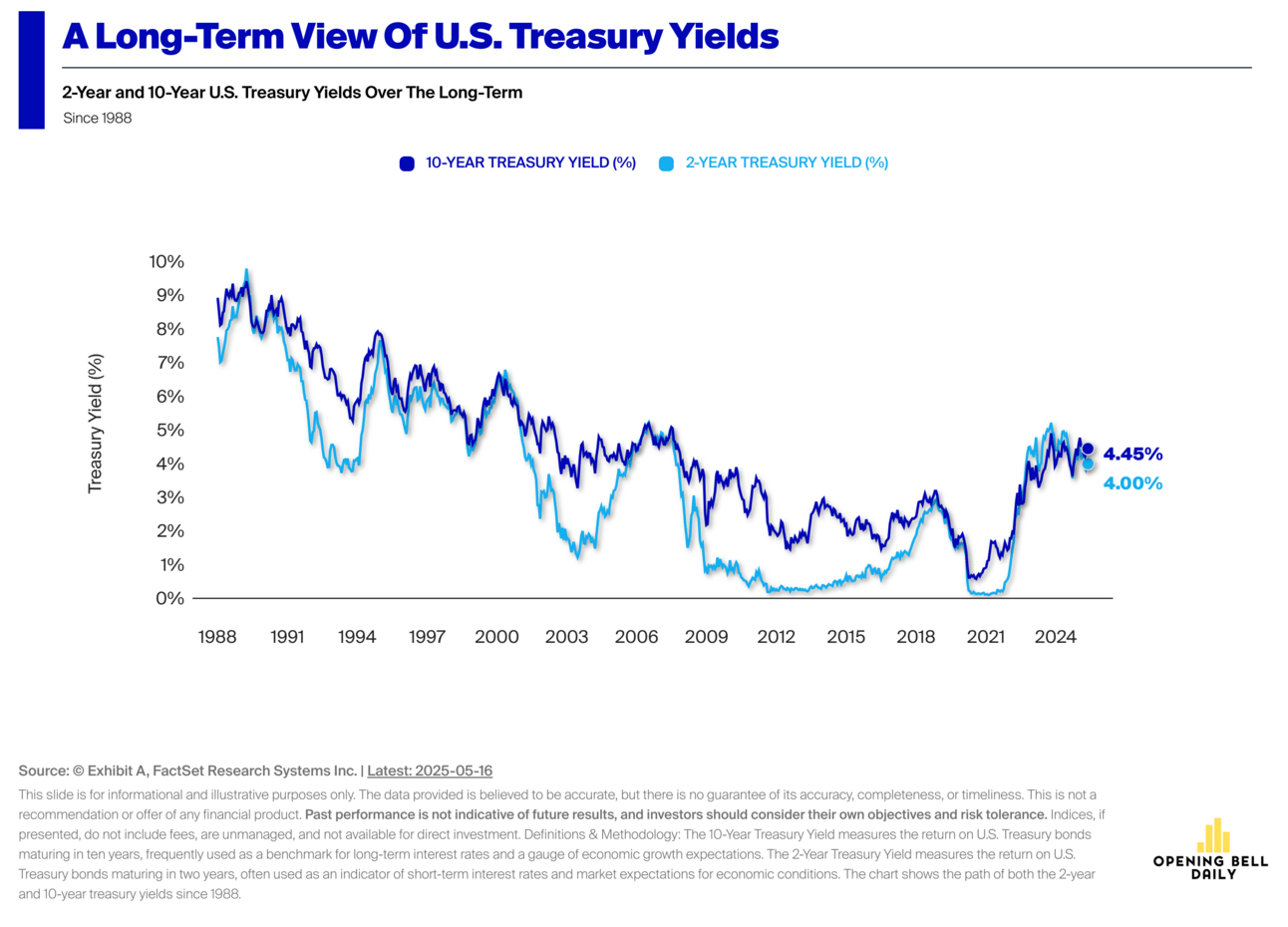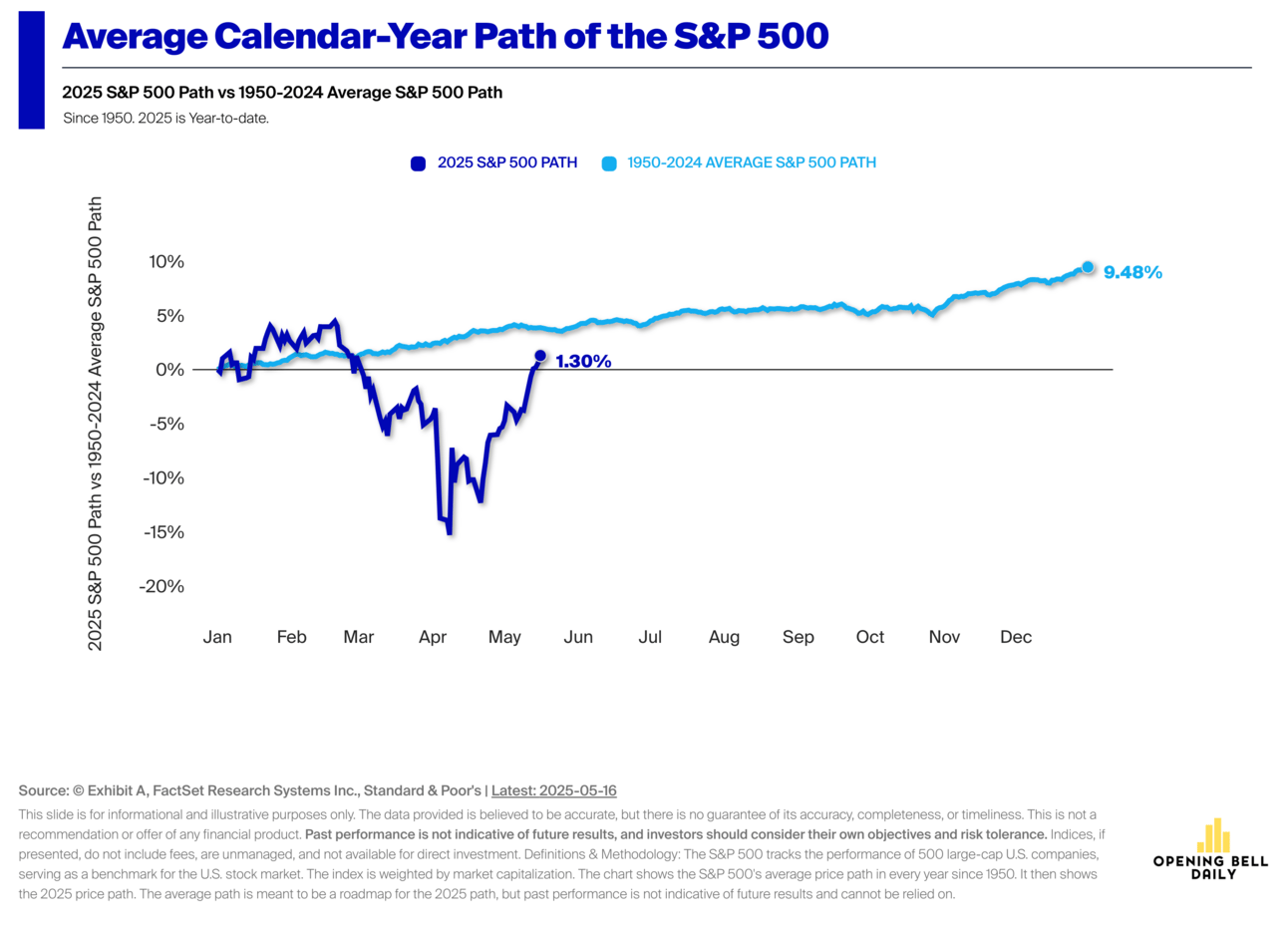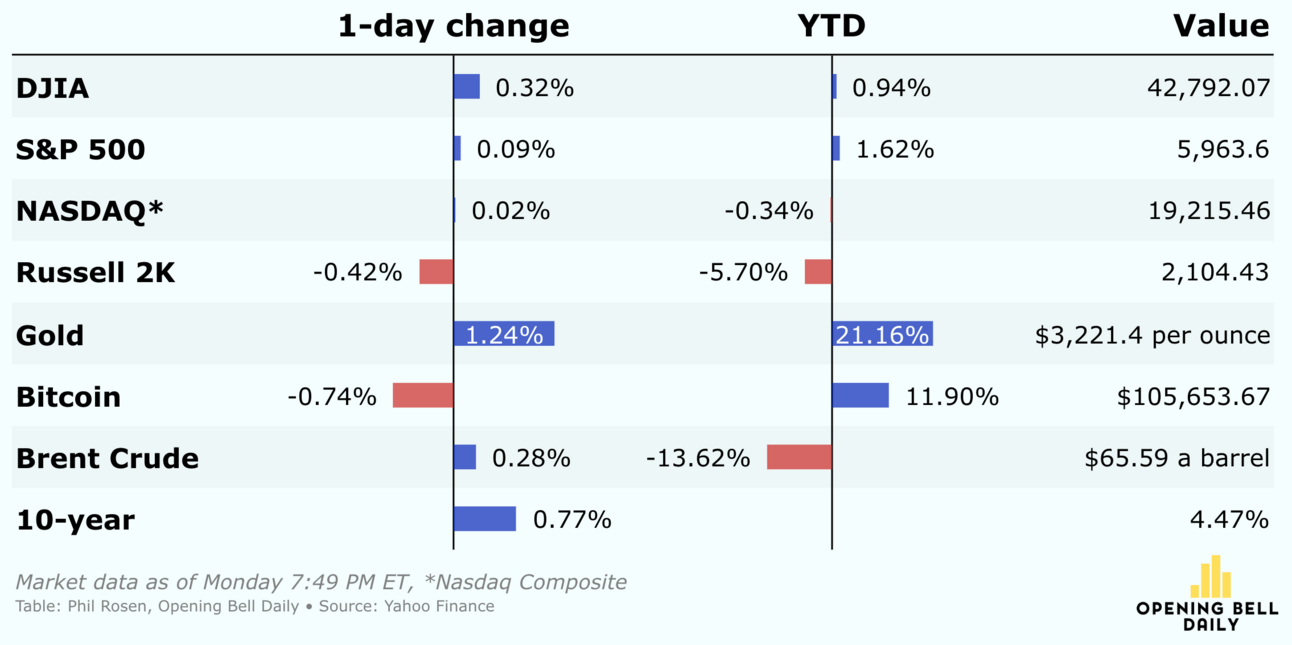Good morning! There’s an old Wall Street saying that stocks are about hope and bonds are about math. Today we’re unpacking why the two aren’t on the same page right now.
📝 Reader note: We work hard each day to make this the best markets newsletter in the world. We would love if you could help us improve by taking this 3-minute survey!
Today’s letter is brought to you by BitcoinIRA!
Why smart investors use BitcoinIRA:
Tax Savings: When you trade in an IRA, you don't have to pay capital gains taxes that can be as high as 37%
Top-Level Security: Assets are custodied with a US based custodian and insured up to $250M²
World Class Customer Service: BitcoinIRA has a team of IRA specialists that will help guide you through every step of the process
P.S. As an Opening Bell Daily reader, you can earn up to $500 in rewards* when you add funds to your account.
Does Moody’s US credit downgrade matter?
Depends who you ask.
The stock market didn’t notice. The S&P 500 secured its sixth winning day in a row and the Dow added 137 points.
Equity investors at this point seem numb to both fiscal calamity and shaky economic sentiment.
Bond traders, meanwhile, responded differently.
Long-dated Treasury yields edged higher, with those on the 30-year breaching 5% — near their highest levels since 2007, save for several brief spikes at the tail end of the pandemic.

Chart courtesy of Exhibit A
“Successive US administrations and Congress have failed to agree on measures to reverse the trend of large annual fiscal deficits and growing interest costs,” according to a statement from Moody’s, which was the last holdout among major ratings agencies to downgrade the US’ credit rating.
S&P cut its rating on the US in 2011, while Fitch did so in 2023.
But ratings agencies aren’t leading indicators. Bond traders began downgrading the US months ago, demanding higher yields as Washington’s fiscal responsibility came into question.
The US stock market — which continues to climb out of its post-Liberation day hole — tends to be more optimistic than its more boring counterpart.
And history suggests stocks may have the right read.
Nicholas Colas and Jessica Rabe at DataTrek Research — who have been on fire with their analysis lately — pointed out Monday that neither of the two prior downgrades preceded a recession.
In fact, both lined up with long-term bull markets for stocks.

Chart courtesy of Exhibit A
“Rating agencies play a critical role in capital markets, but their decisions about US sovereign debt have never signaled anything useful about future asset prices,” Colas and Rabe said.
Moreover, it’s unlikely institutional players will dump US bond holdings for one of the remaining AAA-rated countries like Canada, Norway or Denmark on account of Moody’s.
Ira Jersey, a rates strategist at Bloomberg Intelligence, said that Monday’s Treasury sell-off will likely be limited as there are few, if any, “structural reasons” for investors to sell Treasuries.
So while this isn’t a Liz Truss moment, the math certainly justifies the jitters in the bond market.
US federal debt has more than tripled from $10 trillion in 2008 to over $36 trillion today. What’s more, the deficit has averaged around 3% of GDP since 1962, though it has doubled to roughly 7% in the post-pandemic years.
“While the Moody’s decision could provide a fresh catalyst for another leg higher in rates as investors have become increasingly nervous about US policy more broadly, we think the bond market has been pricing in the deteriorating fiscal outlook for some time now,” said Raymond James’ chief investment officer Larry Adam.
“That is a key reason why longer-maturity yields have been rising despite weakening growth prospects.”
Market snapshot

Elsewhere
📊 Nvidia’s navigating the costly chip ban. Jensen Huang said in Taipei Monday that the White House’s ban on its H20 chips for China has cost the company $15 billion in sales. The exec called it “enormously costly” and “painful.” (Yahoo Finance)
💰JPMorgan’s Jamie Dimon looks to succession planning. The CEO said he’s still planning to step down in the next few years, and that his team has been thinking over options. “It’s up to the board.” (Barron’s)
Steal top portfolio manager’s under-the-radar trades
Elite investors outperform the market for a reason. Opening Bell Daily’s Best Ideas Club gives you direct access to the undervalued trades top fund managers are making right now.
Rapid-fire
Highest number of S&P 500 companies citing “uncertainty” on earnings calls since 2020 (FactSet)
Leaders Trump and Putin spoke on the phone for 2 hours Monday but no immediate breakthrough was announced (WSJ)
UnitedHealth stock surged 8.2% Monday and five company insiders including its CEO bought more stock (Barron’s)
Capital One completed a $35 billion takeover of Discover after the mega-merger broke news more than a year ago (Yahoo Finance)
Mortgage rates crossed over 7% on Monday as homebuilder sentiment tumbles (CNBC)
The CEO of Citi said markets are beginning to price greater risk into assets as we speak (Yahoo Finance)
Bridgewater founder Ray Dalio said the risk to US Treasurys is worse than what Moody’s is saying (CNBC)
Last thing
About me
📰 I’m Phil Rosen, co-founder and editor-in-chief of Opening Bell Daily. I’ve published books, lived on three continents, and won awards for my journalism, which has appeared in Business Insider, Fortune, Yahoo Finance, Bloomberg and Inc. Magazine.
I write our flagship newsletter to prepare you for each trading day, unpacking markets, economic data and Wall Street with analysis you won’t find anywhere else. Feedback? Reply to this email, ping me on X @philrosenn, or write me directly at [email protected].


